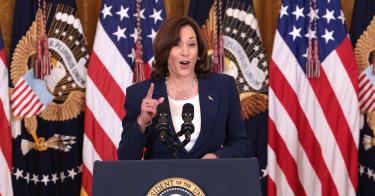In the midst of President Biden’s campaign to sell "Bidenomics" to American voters, Vice President Kamala Harris made a curious admission. Speaking about the costs of getting an abortion (so not Bidenomics), she stated that "[m]ost Americans are a $400 unexpected expense away from bankruptcy."
Of course, as with most dramatic White House economic claims, it wasn’t exactly true. But you have to give her credit for raising a counter-narrative the Biden administration is otherwise choosing to ignore.
The fact is that American families are in trouble, deep trouble, and it’s far more significant than any Bidenomics spin can conceal.
Harris’s point comes from a recent Morning Consult survey which found that in the third quarter of this year only 46% of Americans could cover a $400 unexpected expense without going into debt. That’s not the same as being $400 away from bankruptcy, but it’s still really bad. It shows how expenses as commonplace as a surprise car repair or a medical bill are forcing many American families into debt—at a time when interest rates are disturbingly high.
It also raises a very disconcerting question: Is this the new Bidenomics normal? Let’s look at the data.
>>> Interest Rates Are Soaring, Raising the Alarm for a Painful Reckoning for America
The Lending Club’s Paycheck-to-Paycheck Report for June confirms the Morning Consult survey. It found that a majority of Americans (54%) were living paycheck to paycheck. That includes 53% of consumers who earn $50,000 to $100,000 per year. So, this problem extends well beyond lower-income families, although it certainly hits you harder the less you have.
But what about personal savings? American received a lot of cash from the government during the pandemic. In fact, when Biden took office, Americans had $2.3 trillion in personal savings. That number shot up to $5.7 trillion following Biden’s March 2021 ironically named "American Rescue Plan."
But by June of this year, a mere 27 months later, personal saving had dropped by nearly $5 trillion to a much diminished $862 billion.
Again, it isn’t just lower-income Americans who have watched their savings diminish. According to a Bloomberg analysis, the average middle-class household has lost over $33,000 in real wealth in just the past year.
The situation is so bad that Americans are even draining their 401(k) plans to cover expenses. According to Bank of America’s analysis of its clients’ employee benefits programs (with a total of over 4 million plan participants), 36% more people drained their retirement accounts to make ends meets in the second quarter of 2023 as compared to the same period last year.
So, where did all that money go? Well, you may have noticed that Bidenomics-induced inflation has driven the cost of living up—a lot. Let’s look at it in dollar terms, which is how most Americans experience inflation.
The Bureau of Labor Statistic publishes the Consumer Price Index (CPI) each month, a common measure of inflation. CPI takes a basket of commonly purchased goods and services and prices them on a monthly basis. In January 2021, when Biden took office, that basket cost about $261.50. In July of this year, the same basket cost $305.70. That’s a huge 16.9% increase in only two and a half years. It’s also larger than the CPI increase for any full four-year presidential term since the 1980s, and Bidenomics has 16 months to go.
Exacerbating the problem, wage growth has failed to keep pace with inflation—increasing only 13% since Biden took office (versus nearly 17% for inflation). When you’re living paycheck to paycheck, as most Americans are, that kind of disparity hurts.
>>> Joe Dares Demand Our Thanks for “Bidenomics”? His Fiscal Insanity Plunged Us Into This Crisis
So, with savings increasingly depleted and wages failing to keep up with increased living expenses, many Americans are resorting to their credit cards in an effort to make ends meet. According to the Federal Reserve Bank of New York, in the second quarter of this year, credit card debt rose to $1 trillion – the highest number ever.
And that amount of credit card debt is a huge problem with 51% of Americans unable to pay off their entire balance each month—so they let it revolve to the next month at an average budget killing interest rate of nearly 15%, according to JD Powers’ recent Annual Credit Card Satisfaction Survey. Perhaps more disconcerting, Wallet Hub reports that the current average credit card interest rate is slightly over 22%. Either rate would be devastating for already stretched family budgets.
Bottom line: When you read that "Bidenomics is working," know that it’s not. Claims to the contrary are simply untrue.
In reality, a majority of Americans are unable to cover a common but unexpected $400 expense because their cost of living is way up and real wage growth has failed to keep pace. So, they are draining their savings and retirement accounts and maxing out their credit cards despite crippling interest rates.
This is Bidenomics in a nutshell, and it will be the new normal – unless we make a change next November.
This piece originally appeared in Fox News



